
Bruce Bower
Behavioral Sciences Writer, Science News
Bruce Bower has written about the behavioral sciences since 1984. He often writes about psychology, anthropology, archaeology and mental health issues. Bruce has a master's degree in psychology from Pepperdine University and a master's degree in journalism from the University of Missouri. Following an internship at Science News in 1981, he worked as a reporter at Psychiatric News, a publication of the American Psychiatric Association, until joining Science News as a staff writer. In 1996, the American Psychological Association appointed Bruce a Science Writer Fellow, with a grant to visit psychological scientists of his own choosing. Early stints as an aide in a day school for children and teenagers with severe psychological problems and as a counselor in a drug diversion center provided Bruce with a surprisingly good background for a career in science journalism.

All Stories by Bruce Bower
-
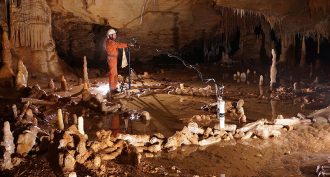 Archaeology
ArchaeologyNeandertals: Ancient Stone Age builders had tech skills
Neandertals built stalagmite circles in a French cave 176,500 years ago. These structures show that these ancient human cousins had social and technical skills.
-
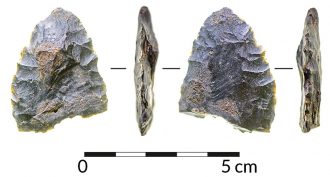 Archaeology
ArchaeologyHunter-gatherers roamed Florida 14,500 years ago
Tools and bones from a submerged site in Florida show that Stone Age people lived in North America earlier than was once thought.
-
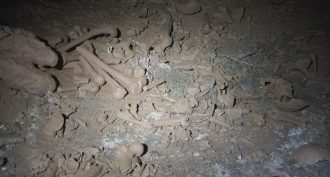 Archaeology
ArchaeologyRemains of long-ago child sacrifices found in Belize cave
Thousands of bones in Belize’s Midnight Terror Cave show that the Maya had a long tradition of human sacrifices. New data show that many had been children.
-
 Genetics
GeneticsPacific islanders got a double dose of Stone Age DNA
Unlike other people, certain Pacific Islanders inherited DNA from two ancient human ‘cousins.’
-
 Humans
HumansSlicing meat may have aided human evolution
An experiment with modern-day humans shows how slicing meat could have saved human ancestors energy — and let their bodies and brains get bigger.
-
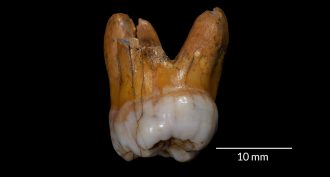 Humans
HumansNews Brief: Ancient teeth point to Neandertal relatives
New analyses of some teeth found in Siberia indicate that Neandertal cousins known as Denisovans lived there for at least 60,000 years. That would have had them around the same place as modern humans — and at nearly the same time.
-
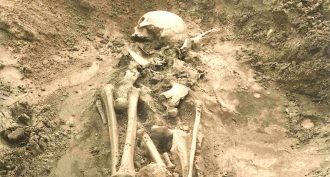 Genetics
GeneticsThe earliest evidence of plague
Plague is best known as the killer disease that wiped out nearly half of Europe during the 1300s. But the germ infected people up to 3,000 years earlier than that, DNA from ancient teeth now show.
-
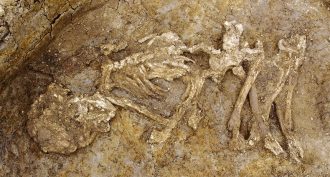 Humans
HumansBronze Age mummies unearthed in Great Britain
Bronze Age communities from southern England to Scotland appear to mummified their dead. Tests show this occurred between roughly 3,000 and 4,000 years ago.
-
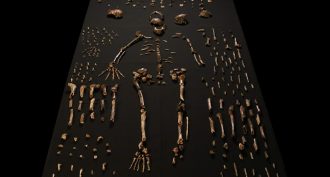 Fossils
FossilsFossils: Is this new species a human relative?
Fossils found in an underground cave in South Africa may be from a previously unknown species of the human genus, Homo.
-
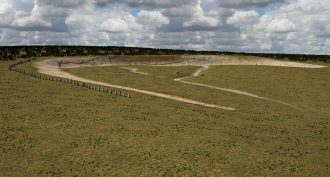 Humans
HumansPicture This: ‘Super-henge’ buried near Stonehenge
Scientists using ground-penetrating radar discovered a massive stone monument, now buried, at a prehistoric village near Stonehenge.
-
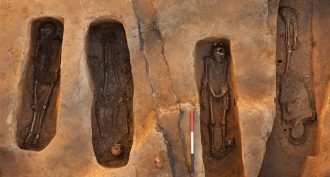 Humans
HumansJamestown: Unearthed graves tell tales of colony leaders
The newly uncovered 400-year-old remains of four leaders of the Jamestown settlement in Virginia reveal details of the notable’s lives — and deaths.
-
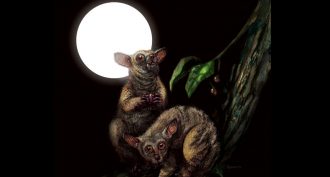 Fossils
FossilsRemains of ancient primate found in Oregon
Scientists have found a few teeth and a fossil jaw of an ancient species of primate. It may be related to modern lemurs or tarsiers.